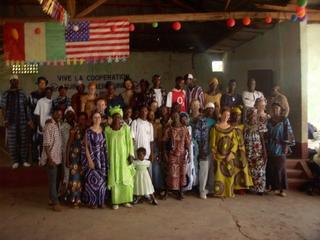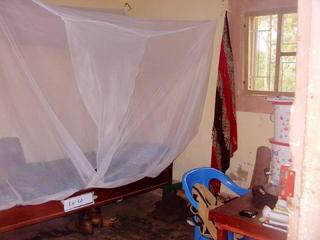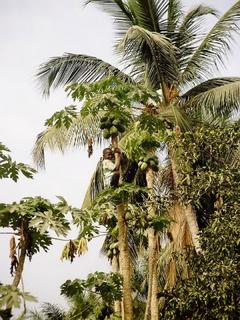Thursday, October 20, 2005
Back Home in the US
I had to keep my leg parallel to the ground at all times, to keep the blood pressure low and allow the skin graft to take to my leg. Therefore I couldn't use crutches or climb stairs, so we rented out a wheelchair and portable commode and I took up residence on a cot over the oriental rug in our living room. I spent the next month or so in the living room and den on the first floor of my house, with 2 excursions to the doctor's office.
Dakar, Senegal
I arrived in Dakar, Senegal at night and was shuttled in a nice ambulance to a Dakar clinic, where I was hospitalized for another week. I cleaned out Dakar of a strong IV antibiotic, and the regional Peace Corps doctor, Dr. Savage, had to pay the Senegalese Army General a visit to track down some more for me. I had the dressings on the wound changed regularly under general anesthesia and some tunnels added on the sides of the wound. After a week I was discharged from the hospital and went to live at Dr. Savage's house with his family. It was amazing living with them. We had burritos and lasagna for dinner; serious treats after a life of rice and oily fish sauce every night during training in Guinea. Another Peace Corps volunteer from Guinea, Sandra, was also in Dakar getting physical therapy for her knee, so she helped me a lot while I was in the hospital. We even went out to dinner with a former volunteer in Guinea who was living and working in Dakar. I spent two weeks with the Savages and planned on getting skin grafts in Senegal and returning back to Guinea. Peace Corps Washington decided it would be wiser for me to return to the US for the skin grafts and recovery.
Back to Conakry
After the surgery, redness continued to move up my leg towards my hip. This showed that the infection was still spreading and I needed to get additional care. Peace Corps arranged for an emergency paramedic jet to land in Conakry. It was rush hour by the time I had to get to the airport, and the medical officer was taking the Peace Corps vehicle back to the Conakry house to pick up my passport, etc. from the safe. Therefore they had to transport me in the hospital's ambulance to the airport, where I would meet back up with the Peace Corps. This ambulance was a glorified metal shell of a minivan, with a blaring siren on the top. An eight-month pregnant nurse sat up front and a thin male nurse was in the back with me. Technically he was in the back with me, but he spent most of the ride with as much of his upper body as he could fit shoved out of a small 1 ft x 1ft square hole (window?) in the side of the ambulance, waving to friends in the streets of downtown, suddenly a celebrity. As for me, I was sitting in one chair and had my leg propped up on a tv dinner table. Neither was bolted to the ground, and the tv table had wheels, so I would slide around the inside, trying to keep my leg as still as possible. Other than that, there was nothing else inside the ambulance. Seriously, nothing. I was extremely nauseous from the medications I was taking and asked for a plastic bag. The only thing they could rummage up to give me was a broken ice cube tray, which leaked puke all over me. Eventually we made it to the airport, the siren blaring in my brain long after they had turned it off.
Conakry to Labe

We woke up early to pile up all of our stuff around taxis headed towards the regional capitals. We left a lot of stuff with the Peace Corps to drop off for us on the mail run headed up country a few days later. We fought back tears, knowing we wouldn't see some of our good friends from training for the next three months. We all planned to gather again for In-Service Training in mid-July. Nine hours later, my taxi arrived in the regional capital of the Fouta Djallon, Labe.
Many volunteers in the Fouta gathered to welcome us to our new region. They planned amazing dinners for us and took us to Porto Falls, a great secret swimming hole with waterfalls off of a dirt road north of the city. We did some more shopping in the Labe market before heading to site. The small cut on my left shin that I got in Conakry running on the beach appeared to be infected. I woke up in the early morning with intense pain and swelling in the leg and with a temperature of 103.5F. I took it easy and started on antibiotics after consulting with the Peace Corps Medical Officers (PCMOs). A few days later my temperature had gone down a bit but my leg was still getting worse. I went to see the doctor in Labe and he said I needed to go back to the capital to get some of the infected tissue in my leg taken out.
Market Shopping in Conakry
Farewell Ceremony and Affectation
 Agroforestry trainees with homestay families from Yorokogiya
Agroforestry trainees with homestay families from Yorokogiya Trainees wearing indigo fabrics popular in the Fouta Djallon region
Trainees wearing indigo fabrics popular in the Fouta Djallon regionAll of my trainee group dressed up in traditional Guinean outfits and said a formal farewell to our home stay families. I wore an outfit my home stay family had given me for Tabaski, an Islamic holiday that celebrates the sacrifice Abraham offered to make of his son to God. We packed up our things and headed to the capital, Conakry, for our official swearing-in as volunteers. The ceremony was at the American ambassador's house on the ocean. Speeches were delivered in French and each of the three local languages. I gave the speech in Pular. I translated Ralph Waldo Emerson's definition of success as part of the speech, and couldn't help cracking up when I had to say "Ralph Waldo Emerson" after minutes of sing-songy Pular.
To laugh often and much;
To win the respect of intelligent people and the affection of children;
To earn the appreciation of honest critics and endure the betrayal of false friends;
To appreciate beauty, to find the best in others;
To leave the world a bit better, whether by a healthy child, a garden patch or a redeemed social condition;
To know even one life has breathed easier because you have lived.
This is to have succeeded.
That night some of us went swimming in the ocean by the Peace Corps house. I was running on the beach and tripped over a rock formation in the dark. I ended up with a few scrapes that healed quickly and all appeared well.
Counterpart Workshop and Site Visit
We were supposed to travel to our sites from Mamou for a week-long site visit. Unfortunately, there was an assassination attempt on the Guinean President, Lansana Conte, the week before and the police and military had increased their presence on the roads (they stop all cars for bribes at illegal road checkpoints). Peace Corps decided we were not ready to travel across the country on our own with the increased police presence, so site visit was rescheduled and we returned back to the training site.
Two weeks later we traveled to our sites for the first time. A group of us traveling to the Fouta squished into a cab for a 7 hour taxi ride. We met some of the current volunteers serving in the region, ate a yummy dinner they cooked for us, and played a rousing game of "Celebrity." The Labe regional house is a little Peace Corps haven with movies, music tapes, a kitchen with stove and spice rack, and American pop culture magazines on the coffee table. My closest neighbor at site, an education volunteer named Brian, showed my friend Melanie and me around to our sites. Brian's site is a 20 minute bike ride from mine, Melanie's is 1.5 hrs, and Labe is 1.5 hrs. We spent one night at each site and took taxis between them. We donned our traditional Guinean attire each morning as we moved to a new site and met with the village leaders.
We visited my site on market day. I stepped out of the taxi into a sea of color. Women were selling all kinds of fruits and vegetables, peanut butter, plastics, etc. The district president showed me my house. It's concrete with high tin roofs and includes a bedroom, salon, and porch. The house is surrounded by a brick wall and in the wet season corn grows in the front yard. A public latrine is in the front corner by the gate (but hopefully that will disappear when I move in?). There isn't electricity or running water, but there's a solar-powered pump put in by a German non-governmental organization with amazing water pressure in the middle of town.
I met the elders of the village and the leaders of the women's groupement in a formal ceremony in a small room off of the main street. They led me around the village to tour the water pump and schools. The village already uses a sensibilization center (place for community awareness meetings on topics of health and environmental issues) and an adult literacy center. One man I met was encouraging the use of mud stoves and showed me two he had built for women in the center of the village. It was exciting to see a community so motivated for self-improvement.
After a great break from the everyday grind of training, we returned back to the training site outside of the capital for a few short weeks. We practiced giving community sensibilizations on agroforestry topics. My individual presentation was on intercropping possibilities in the Guinean garden.

Pre-Service Training (PST)
During the 10-week training we lived with home stay families in the villages of Yorokogiya, Gberiyere, and Km5. I lived with the Camara family in the small village of Yorokogiya. I had a mom, dad, grandmother, aunt, and lots of brothers and sisters. Some weren't "real" brothers and sisters in American terms; we would consider them cousins or extended family. But they were so much a part of my immediate home stay family that it took a long time to figure out which kids came from where. I'm still a bit unsure. My beautiful brothers and sisters: Ibrahima, Mariama, Marissa, Aicha, Mamata, Solomon, Sakhou, Ali, Mohammed, and Salematou. I was called Aicha Camara.
 My homestay family, the Camaras
My homestay family, the Camaras
 Homestay house; my doorway has the pink curtain
Homestay house; my doorway has the pink curtain
 Kids in my homestay family; from back: Mariamba, Aicha, Sekou, Salematou, neighbor
Kids in my homestay family; from back: Mariamba, Aicha, Sekou, Salematou, neighbor

My room
I showed up in Yorokogiya with a scratchy voice. I was a bit too excited during my first week in country and had lost my voice. Some of the families at the Adoption Ceremony definitely thought I was possessed. It was a bit awkward.
I was shocked one day to turn and see my tiny brother Ali at the top of a palm tree harvesting a coconut for my mom. My sister Marissa convinced my cousin Fatimata (who lived with us for 2 weeks or so) that I was possessed since I had white skin and blue eyes. Fatimata was terrified of me for the first few days until I convinced her that Marissa was being ridiculous.

Ali getting a coconut for his mom
 Mariamba with her new baby, Fatimata, Aicha, Marissa
Mariamba with her new baby, Fatimata, Aicha, Marissa
Each sector (agroforestry, health, and business development) had training classes and exercises based in its village. The 10 agroforestry trainees managed a small organic garden in a space in the lowlands given to us by the village of Yorokogiya. While hoeing the rows with the African dabas (hoes), we discovered huge mean biting ants (and suddenly realized why our village picked such a nice spot for our garden). Our Guinean trainers taught us many agroforestry techniques including basic gardening, mud stove construction to increase wood fuel efficiency, fruit tree grafting, solar drying and cooking, and reforestation.
 Agroforestry training in the garden
Agroforestry training in the garden

Agroforestry building a mudstove (mudstoves capture heat, improving efficiency, and reducing wood required for fuel)

Agroforestry trainees after the talent show performance
Some sessions brought the entire training group together to discuss health and safety issues and Guinean culture. We studied French in small groups with Guinean language trainers and after a month of training, we found out where our sites would be and started local language training. My site is in the mountainous region in the middle of Guinea, the Fouta Djallon. I started learning Pular, the melodic language of the Peuhl people spoken by 14 million people in West Africa. 2.5 million people speak Peuhl-Fouta, the dialect they speak in Guinea.
We also had fun times bonding together with our fellow trainees. We all had Peace Corps mountain bikes so we could bike between villages to hang out. We played basketball on a random concrete court on top of a mountain behind Yorokogiya in a palm tree plantation. The court seriously seemed like basketball's version of "Field of Dreams." It's in the middle of nowhere with a lovely mountaintop view just steps from the court.

"Field of Dreams" basketball court above Yorokogiya

Group excursion by boat to islands off the coast of Conakry

Group excursion to Les Voiles de Mariees; (Bridal veil falls) near Kindia
We biked 18km to a Lebanese restaurant at the foot of huge cascades in the wet season. It was the dry season during training so the falls were reduced to a tiny trickle, but we could explore the riverbed above the falls and swim in the "lake." Two friends and I celebrated Easter with brunch there.
